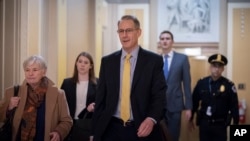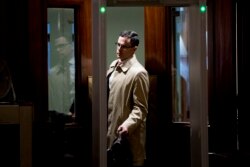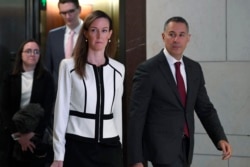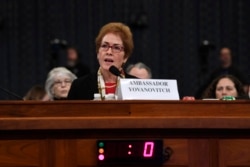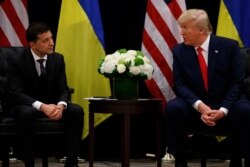The House Intelligence Committee overseeing the impeachment inquiry against President Donald Trump released transcripts of depositions Saturday from two officials who will be questioned in public hearings next week.
Congressional investigators also met Saturday in a closed-door session with Mark Sandy, a longtime career official with the Office of Management and Budget, who could provide valuable information about the U.S. delay of about $400 million in aid to Ukraine last summer.
The transcripts released Saturday were from previous closed-door depositions with former National Security Council official Tim Morrison and Jennifer Williams, an aide to Vice President Mike Pence. Morrison and Williams are scheduled to be questioned in public Tuesday by the House panel.
At the heart of the Democratic-led impeachment inquiry against the president is whether Trump withheld needed military aid to Ukraine in an effort to pressure Ukrainian officials to investigate former Vice President Joe Biden, a potential opponent of Trump’s in the 2020 presidential election, and his son, Hunter Biden. No wrongdoing by either Biden has been substantiated.
Morrison’s deposition largely confirmed testimony offered by other officials so far in the inquiry, but he also answered questions regarding a shadow diplomacy in Ukraine being waged by Rudy Giuliani, Trump’s personal lawyer.
'Tried to stay away'
In the transcript, Morrison said he “tried to stay away from” discussions in which U.S. Ambassador to the European Union Gordon Sondland, Giuliani and others tried to persuade Ukraine President Volodymyr Zelenskiy to investigate the Bidens and Burisma Holdings, a Ukraine gas producer.
He also used the term the Burisma “bucket,” which included investigations into the Bidens, and the role of Democrats in the 2016 election. Hunter Biden served on the board of Burisma.
Morrison also described witnessing an exchange between Sondland and Andriy Yermak, an aide to the Ukraine president, at a summit in Warsaw.
He testified that Sondland told him Yermak?: “What could help them move the aid was if the prosecutor general would go to the mike and announce that he was opening the Burisma investigation.” The prosecutor general is Ukraine’s top legal official.
“It was the first time something like this had been injected as a condition on the release of the assistance,” Morrison? said in his deposition, adding he “did not understand why Ambassador Sondland would be involved in Ukraine policy, often without the involvement of our duly appointed Chief of Mission, Ambassador Bill Taylor.”
The transcript also describes a Sept. 11 meeting, which Morrison said he did not attend but was briefed about, in which Vice President Pence and Ohio Senator Rob Portman “convinced the president that the aid should be disbursed immediately,” and that it was “the appropriate and prudent thing to do.”
In her testimony, Williams described her role, as a national security adviser to Pence on European and Russian issues, as keeping “the vice president aware and abreast of all foreign policy issues going on in that region,” which includes Ukraine.
Williams, who listened in on the July 25 call between Trump and Zelenskiy, was asked if she had any concerns after listening to the conversation.
“I certainly noted that the mention of those specific investigations seemed unusual as compared to other discussions with foreign leaders,” she said according to her deposition. When asked why they were unusual, she said, “I believed those references to be more political in nature and ... struck me as unusual and inappropriate.”
Closed-door hearing
On Saturday, Sandy, a senior White House official, was the first agency employee to be deposed in the inquiry after three employees appointed by Trump defied congressional subpoenas to testify. He had received a subpoena to appear.
Sandy was among the career employees who questioned the holdup of the aid to Ukraine, according to people with knowledge of the matter.
His signature is on at least one document that prevented the provision of the aid to Ukraine, according to copies of documents investigators discussed during an earlier deposition. A transcript of the discussion has been publicly disclosed.
Sandy appeared before the House foreign affairs, intelligence, and oversight and reform committees.
In a statement, the three Democratic-led committees said they are investigating “the extent to which President Trump jeopardized national security by pressing Ukraine to interfere in the 2020 election and by withholding security assistance provided by Congress to help Ukraine counter Russian aggression, as well as any efforts to cover up these matters.”
Sandy’s deposition comes one day after the ousted former U.S. Ambassador to Ukraine Marie Yovanovitch testified at the congressional impeachment inquiry into President Trump that she was “shocked and devastated” over remarks Trump made about her during a call with Zelenskiy, the Ukrainian president.
“I didn’t know what to think, but I was very concerned,” she told the House Intelligence Committee on Capitol Hill in Washington. “It felt like a threat.”
Her testimony was consistent with her closed-door testimony last month when she said she felt threatened and worried about her safety after Trump said “she’s going to go through some things.”
Phone call
Late Friday, after Yovanovitch’s testimony, House impeachment investigators met in closed session with David Holmes, a State Department official. Holmes told lawmakers he was having lunch with Sondland and overheard a phone call between Sondland and Trump, in which the president inquired about the Ukraine president’s willingness to investigate the Bidens.
The phone call occurred one day after the July 25 phone call between Trump and Zelenskiy, which is the focus of the impeachment probe.
According to a transcript of his opening statement to investigators, [[ https://www.lawfareblog.com/opening-statement-david-holmes-impeachment-inquiry ]] Holmes said: “I heard Ambassador Sondland greet the president and explain that he was calling from Kyiv. I heard President Trump then clarify that Ambassador Sondland was in Ukraine. Ambassador Sondland replied, yes, he was in Ukraine, and went on to state that President Zelenskiy “loves” Trump.
“I then heard President Trump ask, ‘So, he’s gonna do the investigation?’ Ambassador Sondland replied that ‘he’s gonna do it,’ adding that President Zelenskiy will do ‘anything you ask him to.’ Even though I did not take notes of these statements, I have a clear recollection that these statements were made,” said Holmes, who is an aide to acting U.S. Ambassador to the Ukraine William Taylor.
He said that after the phone call ended, he asked Sondland about Trump’s “views on Ukraine. In particular, I asked Ambassador Sondland if it was true that the President did not ‘give a s—t about Ukraine.’ Ambassador Sondland agreed that the President did not ‘give a s—t about Ukraine.’ I asked why not, and Ambassador Sondland stated that the President only cares about ‘big stuff.’
“I noted that there was ‘big stuff’ going on in Ukraine, like a war with Russia, and Ambassador Sondland replied that he meant ‘big stuff’ that benefits the President, like the ‘Biden investigation’ that Mr. Giuliani was pushing,” he said, according to this statement.
Next week, the House panel will hold public hearings again. The schedule for testimony includes:
Tuesday: Williams; Lt. Col. Alexander Vindman, former director for European Affairs at the National Security Council, Ambassador Kurt Volker, former U.S. special envoy to Ukraine; and Morrison.
Wednesday: Sondland; Laura Cooper, deputy assistant secretary of defense for Russian, Ukrainian and Eurasian Affairs; and David Hale, under secretary of state for political affairs.
Thursday: Fiona Hill, former National Security Council senior director for Europe and Russia.




